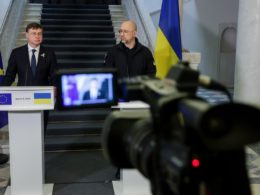The EU's attempt to secure a crucial €50 billion financial aid package for Ukraine faced a setback as Hungary's Prime Minister, Viktor Orbán, vetoed the proposal overnight into 15 December, raising questions about Europe's continued support for Kyiv.
Charles Michel, the President of the European Council, announced that nearly all of the EU's 27 member states endorsed the €50 billion (approximately $52 billion) financial support package for Ukraine, with only one country in opposition. The EU leaders were locked in negotiations over the package until early this morning.
“One leader couldn’t agree on this,” Michel said at a news briefing 3 a.m., referring to Hungarian PM Orbán, The New York Times reports.
Dutch Prime Minister Mark Rutte reported that out of the 27 EU member states, 26 were in agreement regarding the Ukraine funding, but that “Viktor Orban, Hungary, is not yet able to do that. I hope next year.”
Michel stated that EU leaders would reconvene early the following month to discuss the financing further and make another attempt at achieving unanimous agreement, a prerequisite for the plan's approval.
The leaders explore potential avenues for providing financial assistance to Kyiv, even if it means circumventing Orbán's input.
According to CNN, Rutte said regarding the resumption of the funding talks early in 2024, “Given the state of play in the talks, I am fairly confident that we can get to a breakthrough early next year.” But he added that was “not a guarantee.”
At night, the Hungarian leader announced two of his vetoes during the EU Concil's night meeting, one of which blocked the EU funding for Ukraine:
https://twitter.com/PM_ViktorOrban/status/1735474438034915453
The breakdown of negotiations regarding the funding, deemed vital for Ukraine's financial stability through 2024, comes after numerous unsuccessful attempts by the US Congress to reach an agreement on a $60 billion aid package put forth by the White House, which, CNN notes, has raised fears of weakening Western resolve to sustain the country as it continues to battle against Russia.
It was known in advance that Hungary was going to veto the EU's Ukraine aid package, and anonymous EU officials claimed they had a potential workaround should Hungary’s veto be the case. The "plan B" implied that individual EU countries have the option to arrange their own assistance agreements with Kyiv and together these separate deals could amount to the collective total proposed.
Due to his anti-Ukrainian stance and close ties with Russia, Orbán is believed to be Putin's closest ally among the EU leaders. Previously, the Hungarian leader stalled certain EU sanctions against Russia.
Furthermore, Orbán's Hungary has consistently obstructed Ukraine's efforts to draw closer to NATO for many years, justifying its actions by pointing to Ukraine's educational and language laws. According to Orbán, these laws purportedly infringe upon the rights of Ukraine's Hungarian national minority.
EU's unsuccessful Ukraine aid funding attempts were declared shortly after the leaders granted approval to commence accession talks with Ukraine.
“Historic moment” as European Council decides to open accession talks with Ukraine
The greenlit accession talks mark a significant milestone in Kyiv's journey toward EU membership and represent the EU's endorsement of the country's alignment with the West.
Read also:
- “Historic moment” as European Council decides to open accession talks with Ukraine
- Former Lithuanian foreign minister says Orban wants to undermine EU
- Putin’s Trojan horse? Orban’s veto looms over Ukraine’s EU bid
- Associated Press: Hungary to oppose EU membership talks with Ukraine, minister says
- Reuters: EU has approved over USD 980 million in funds for Hungary amid Ukraine’s membership tensions
- EU prepares “plan B” as Hungary blocks € 500 mn of Ukraine aid
- Officials: EU has ‘workaround’ if Hungary vetoes Ukraine aid





